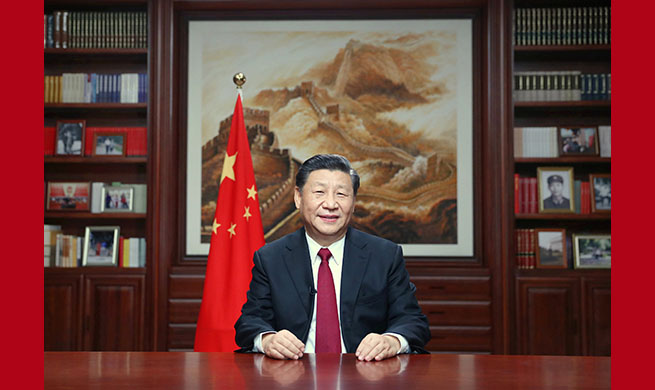ADDIS ABABA, Jan. 3 (Xinhua) -- As the Ethiopian government presently embarked on a robust economic reform initiative, dubbed Homegrown Economic Reform Program, with an ambition to eliminate macroeconomic imbalances and lay the foundation for sustainable and inclusive growth, experts have emphasized the crucial role of fostering cooperation with China in realizing the ambitious initiative.
"Ethiopia has been registering the fastest economic growth for the past conservative years. However, the country is currently facing inflation, rise in the cost of life and foreign exchange shortage, and China's contribution will be the top priority of the homegrown economic reform towards sustaining the country's economic growth," Costantinos Bt. Costantinos, who served as an economic advisor to the African Union (AU) and the UN Economic Commission for Africa (ECA), told Xinhua on Friday.
Noting that the East African country's ambitious three-years-long Homegrown Economic Reform Program "will contribute towards creating a conducive business environment (ease of doing business), poverty reduction and inclusive growth," the expert also stressed that "China can help Ethiopia to strengthen the private sector in the economy and improve the public sector's financial health and to free resources for allocation to important areas of human development."
"China can help Ethiopia in radical macroeconomic policy shake-up towards government income augmenting fiscal reforms to step up private sector activity that has been already initiated by the government to address external vulnerabilities, would maintain robust GDP growth," Costantinos said.
According to the expert, Ethiopia's Homegrown Economic Reform Program "is a well-coordinated response and blueprint to propel the country's economic progress."
"This agenda, crafted through a process of taking stock of our successes, an in-depth review of key bottlenecks and design of adequate remedies, outlines macro-economic, structural, and sectoral reforms that will pave the path for jobs and inclusive growth. Improving Ethiopia's investment climate is a key part of Ethiopia's New Horizon of Hope Action Plan for Jobs," Costantinos argued.
The expert also highlighted Ethiopia's potential in realizing the ambitious economic reform initiative, as he emphasized Ethiopia's demographic dividend, demand, and a committed government, as well as the country's robust investment in physical infrastructure during the past two decades.
"A smart approach to regulation that balances efficiency and promotion of legitimate policy objectives will expand the horizon of possibilities for businesses," he said, adding "the Initiative will address prioritized policy, regulatory and administrative reforms that lower unjustified costs, increased investment, business formation and greater productivity."
Costantinos, however, emphasized the need to overcome major policy, regulatory and administrative challenges that would impede the success of the reform agenda through "comprehensive and well-synchronized set of measures," which include macroeconomic, structural and sectoral reforms.
Costantinos, also professor of public policy at the Addis Ababa University in Ethiopia, further stressed the need for the Ethiopian government to replicate China's experience in eliminating corruption, as he described corruption as a major bottleneck in realizing the major aspirations of Ethiopia's Homegrown Economic Reform Program.
"Corruption is the perpetual spring of all wasteful extravagance in spending and of all disorder. It loads us more than billions in liability, takes away vigor from our arms, wisdom from our councils, and every shadow of authority and credit from the most venerable parts of our constitution," Costantinos argued.
"Chinese experience in fighting corruption is important," the scholar affirmed.
Cooperation with China would also help to bring the much-needed financial strength towards effectively realizing the ambitious economic reform, he said.
Ethiopia, Africa's second populous nation with an estimated more than 105 million population, recently disclosed that it would need as much as 10 billion U.S. dollars to successfully implement the three years long national economic reform, which is expected to be mobilized from domestic resources and international development partners.













